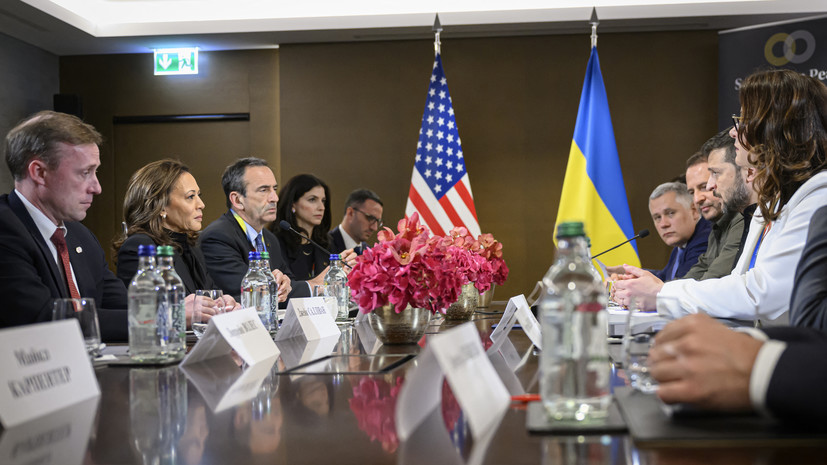The recent international summit on the resolution of the Ukrainian conflict, held in Bürgenstock, Switzerland, has sparked a wave of criticism and skepticism, particularly from Russian officials. Dmitry Medvedev, Deputy Chairman of the Russian Security Council, labeled the summit as 'pure surrealism' on his Telegram channel, reflecting the overall sentiment from Moscow regarding the event. The forum, which took place from June 15-16, aimed to discuss several elements of Ukrainian President Volodymyr Zelensky's 'peace formula' among other issues, but found itself marred by disunity and notable absences.
The summit saw the attendance of representatives from 91 countries, including key western allies like France, Germany, and the UK, but was conspicuously missing major global powers like Russia and China. The absence of these influential countries was seen as a significant drawback to the summit's potential effectiveness. Notable attendees included French President Emmanuel Macron, German Chancellor Olaf Scholz, and British Prime Minister Rishi Sunak. US representation was led by Vice President Kamala Harris instead of President Joe Biden, who prioritized his re-election campaign activities in California.
One of the summit's key outcomes was a communiqué stressing the principles of Ukraine's territorial integrity, the control of the Zaporizhzhia nuclear power plant, and the necessity of a prisoner exchange under the 'all for all' formula. Despite this, the communiqué's impact was dampened as numerous delegations, including those from Venezuela, Indonesia, and South Africa, refused to sign. The lack of alignment among participants revealed the divergent perspectives on resolving the Ukrainian crisis.
Critical voices argue that the summit was destined for failure without the involvement of Russia and China. Experts like political scientist Vladimir Shapovalov have highlighted that any discussion aiming for a lasting peace must include Moscow, without which the summit remains an 'empty and inconclusive' exercise. Shapovalov criticized the absence of President Biden, implying it suggested the summit was not prioritized highly enough by the US administration.
From Ukraine's perspective, President Zelensky regarded the summit as a step forward in pressuring Russia and engaging international support for Ukraine. However, Zelensky's initiatives faced direct confrontations with Russian demands. President Vladimir Putin has offered terms for peace that include Ukraine's non-alignment with NATO, complete military withdrawal from contested regions, and recognition of new territorial realities. This offer, however, was swiftly denounced by Ukrainian and Western leaders as unreasonable and a guise for legitimizing Russian occupation.
Western reaction to Russia's proposals remained critical. NATO Secretary General Jens Stoltenberg and US Defense Secretary Lloyd Austin dismissed the demands, emphasizing that Russia cannot dictate terms to Ukraine. The summit underscored the geopolitical divides that continue to impede progress toward a peaceful resolution.
What remains clear is the international community's need to find a balanced approach that includes all key stakeholders, particularly Russia, to foster a realistic path to peace. Until such inclusivity is achieved, summits like Bürgenstock may not deliver the substantive outcomes necessary for resolving the conflict in Ukraine.
- Swiss President Viola Amherd acknowledged the varied viewpoints at the summit and emphasized the significance of continued efforts towards facilitating direct negotiations between the warring parties. She expressed hope that a follow-up conference could be organized within the year to build on the discussions initiated at Bürgenstock.
- Chancellor Olaf Scholz also stressed the necessity of engaging Russia in future peace negotiations, despite the lackluster outcomes of the current summit. Scholz urged for a diplomatic approach that does not merely freeze the conflict but seeks a comprehensive and just peace that addresses Ukrainian sovereignty and territorial integrity.
- Russia's reaction to being sidelined from the summit was notably negative, with several Russian officials voicing that the exclusion of key players like Russia and China undermines any genuine attempts at conflict resolution. The Kremlin remains firm in its stance that any peace negotiations must directly involve Russia to be constructive.
- The US, while providing significant support packages to Ukraine, continues to balance its global engagements with domestic political agendas. President Biden's absence and subsequent prioritization of fundraising activities highlighted the ongoing complexities in US foreign policy amidst election campaigns.
- Despite the criticisms and challenges faced at the Bürgenstock summit, the demands for a peaceful and sustainable resolution to the Ukraine conflict remain vital. Future diplomatic efforts will need to address the gaps and build more inclusive platforms if a lasting peace is to be achieved.






